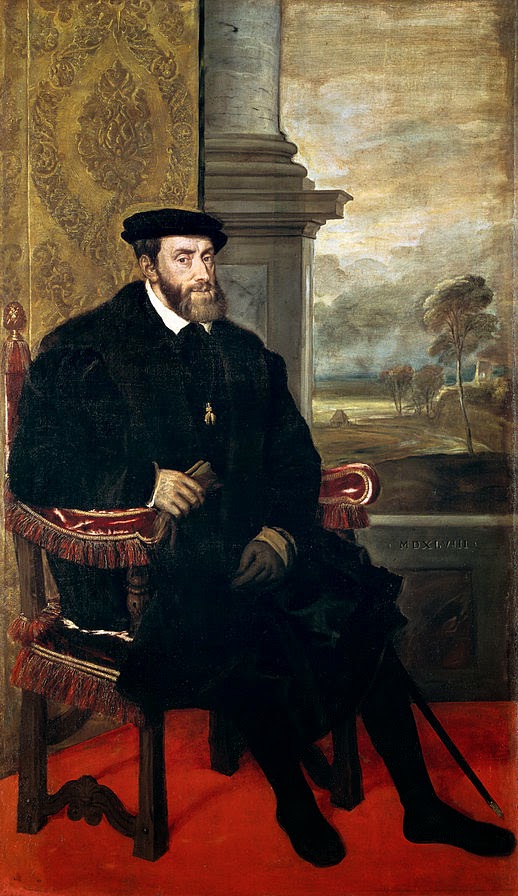Previously on The Peace of Augsburg and the Abdication of Charles V. And now William Robertson.
Time: 1555
Place: Augsburg, Germany
 |
| Charles V by Titian and his colleague Lambert Sustris. cc Wikipedia |
No wonder, then, that Charles' resignation should fill all Europe with astonishment, and give rise, both among his contemporaries and among the historians of that period, to various conjectures concerning the motives which determined a prince, whose ruling passion had been uniformly the love of power, at the age of fifty-six, when objects of ambition continue to operate with full force on the mind, and are pursued with the greatest ardor, to take a resolution so singular and unexpected. But, while many authors have imputed it to motives so frivolous and fantastical as can hardly be supposed to influence any reasonable mind; while others have imagined it to be the result of some profound scheme of policy, historians more intelligent and better informed neither ascribe it to caprice, nor search for mysterious secrets of state, where simple and obvious causes will fully account for the Emperor's conduct. Charles had been attacked early in life with the gout; and, notwithstanding all the precautions of the most skilful physicians, the violence of the distemper increased as he advanced in age, and the fits became every year more frequent as well as more severe. Not only was the vigor of his constitution broken, but the faculties of his mind were impaired by the excruciating torments which he endured. During the continuance of the fits, he was altogether incapable of applying to business; and even when they began to abate, as it was only at intervals that he could attend to what was serious, he gave up a great part of his time to trifling and even childish occupations, which served to relieve or amuse his mind, enfeebled and worn out with excess of pain. Under these circumstances, the conduct of such affairs as occurred of course in governing so many kingdoms was a burden more than sufficient; but to push forward and complete the vast schemes which the ambition of his more active years had formed, or to keep in view and carry on the same great system of policy, extending to every nation in Europe, and connected with the operations of every different court, were functions which so far exceeded his strength that they oppressed and overwhelmed his mind. As he had been long accustomed to view the business of every department, whether civil or military or ecclesiastical, with his own eyes, and to decide concerning it according to his own ideas, it gave him the utmost pain, when he felt his infirmities increase so fast upon him, that he was obliged to commit the conduct of all his affairs to his ministers. He imputed every misfortune which befell him, and every miscarriage that happened, even when the former was unavoidable or the latter accidental, to his inability to take the inspection of business himself. He complained of his hard fortune in being opposed, in his declining years, to a rival who was in the full vigor of life; and that, while Henry could take and execute all his resolutions in person, he should now be reduced, both in counsel and in action, to rely on the talents and exertions of other men. Having thus grown old before his time, he wisely judged it more decent to conceal his infirmities in some solitude than to expose them any longer to the public eye, and prudently determined not to forfeit the fame or lose the acquisitions of his better years by struggling, with a vain obstinacy, to retain the reins of government, when he was no longer able to hold them with steadiness, or to guide them with address.
FOOTNOTE:
Don Levesque, in his memoirs of Cardinal Granvelle, gives a reason for the Emperor's resignation, which, as far as I recollect, is not mentioned by any other historian. He says that, the Emperor having ceded the government of the kingdom of Naples and the duchy of Milan to his son upon his marriage with the Queen of England, Philip, notwithstanding the advice and entreaties of his father, removed most of the ministers and officers whom he had employed in those countries, and appointed creatures of his own to fill the places which they held. That he aspired openly, and with little delicacy, to obtain a share in the administration of affairs in the Low Countries. That he endeavored to thwart the Emperor's measures and to limit his authority, behaving toward him sometimes with inattention, and sometimes with haughtiness. That Charles, finding that he must either yield on every occasion to his son, or openly contend with him, in order to avoid either of these, which were both disagreeable and mortifying to a father, he took the resolution of resigning his crowns, and of retiring from the world (vol. i. p. 24, etc.). Don Levesque derived his information concerning these curious facts, which he relates very briefly, from the original papers of Cardinal Granvelle. But as that vast collection of papers, which has been preserved and arranged by M. l'Abbé Boizot of Besançon, though one of the most valuable historical monuments of the sixteenth century, and which cannot fail of throwing much light on the transactions of Charles V, is not published, I cannot determine what degree of credit should be given to this account of Charles' resignation. I have, therefore, taken no notice of it in relating this event.
Continued on Sunday, November 2nd.
More information here.
No comments:
Post a Comment